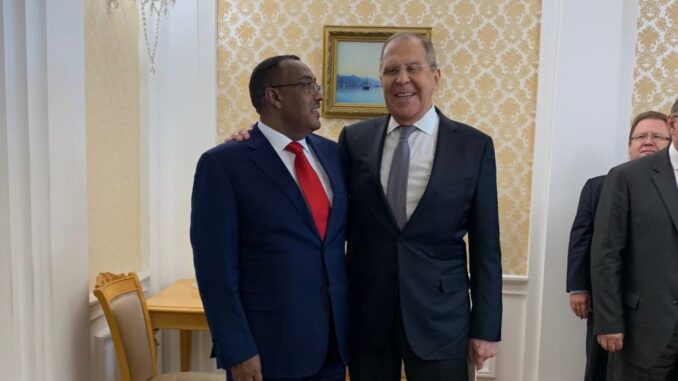
Tracking the second Russia-Africa Summit
|
28 June 2021 12:25

On June 23, Foreign Minister Sergey Lavrov held diplomatic talks with Deputy Prime Minister, Minister of Foreign Affairs of the Federal Democratic Republic of Ethiopia (FDRE), Demeke Mekonnen, who arrived on an official working visit to the Russian Federation, after wrapping up an earlier visit to United Arab Emirates (UAE).
Ahead
of his arrival, the Russian Foreign Ministry in a brief media statement
highlighted the significance of the planned talks and particularly
noted the deep satisfaction about the ongoing development of the
Russian-Ethiopian political dialogue, and the constructive interaction
within the United Nations and other international organizations.
The
statement further identified key areas of Russian-Ethiopian
cooperation, including the promotion of promising mutually beneficial
projects in the fields of energy, infrastructure and agriculture. It
further added that necessary steps would be taken to strengthen the
bilateral legal framework.
During
the first Russia-Africa summit held in October 2019, Russian President
Vladimir Putin met with Ethiopian Prime Minister Abiye Ahmed. They
discussed the bilateral agenda, planned to have many promising projects
designed to expand the volume of trade and economic cooperation.
"Dear
Mr. Minister, Glad to see you in Moscow. We appreciate our regular
political dialogue at the highest and highest level. We remember the
fundamental agreements reached in October 2019 in Sochi as part of the
Russia-Africa summit,” Sergey Lavrov said in his opening remarks while
welcoming Deputy Prime Minister and Foreign Minister of the Federal
Democratic Republic of Ethiopia, Demeke Mekonnen.
Lavrov
said: "We are very interested in the continuation of our mutually
beneficial interaction and put forward joint initiatives. Of course, it
is very important to hear your assessments of the situation on the
African continent and the activities of the African Union, whose
headquarters is located in Addis Ababa. I know that you are interested,
actively participating in the preparation of the second Russia-Africa
summit in 2022.”
Russian
officials have turned their focus, intensifying consultations with the
African Union and Foreign Ministries of African countries, on
preparation for the second Russia-Africa summit scheduled for 2022.
Apparently, a number of African Foreign Ministers have visited Moscow
over the past two to three months, and more yet to come, and that
intended to keep the bilateral political dialogue and to make
preliminary review of policy achievements after the historic gathering
in Sochi.
On
the other hand, Ethiopia has expressed absolute readiness to host the
summit. That was the outcome of the discussion held on April 22 between
Deputy Prime Minister and Foreign Minister of Ethiopia, Demeke Mekonnen,
and Ambassador-at-Large, and Head of the Secretariat of Russia-Africa
Partnership Forum (RAPF), Oleg Ozerov, in Addis Ababa, Ethiopia.
Significant
to recall here that the first summit, indeed opened a new solid
chapter, and concluded with the adoption of a joint declaration.
According to official documents, 92 agreements and contracts, and
memoranda of understanding were signed during the economic forum held as
part of the summit, co-chaired by President Vladimir Putin and Egyptian
leader, Abdelfattah Al-Sisi.
That
beautiful city as summit venue attracted 43 Heads of State or
Government and more than 6,000 participants from Russia, Africa and a
number of foreign countries. With that numerical strength and symbolism,
combined with the mountain of pledges and promises resulting from
various discussions, there is now the need to move systematically to
make noticeable marks on the next stage – a stage that definitely
requires the intensification of geopolitical competition involving
numerous regional and outside players. Russians, however, dream of
hitting their targets to reflect the longstanding, time-tested
relationship.
Many
experts have argued that Russia fears risking broader investments, thus
becomes invisible especially in building infrastructure, modernizing
agriculture, in manufacturing and industry. Understandably, Russia
government is very cautious about making public financial commitments
and, at the same Russian financial institutions are not closely involved
in foreign policy initiatives in Africa.
On April 29, Russian International Affairs Council (RIAC),
a powerful Russian NGO that focuses on foreign policy and global
affairs, held an online conference with participation of experts on
Africa. Chairing the discussion, Igor Ivanov, former Foreign Affairs
Minister and now RIAC President, made an opening speech. He pointed out
that Russia's task in Africa is to present a strategy and define
concrete priorities with the countries of the continent, build on the
decisions of the first Russia-Africa summit.
On
the development of cooperation between Russia and African countries,
Igor Ivanov pointed out a few steps here: "Russia's task is to prevent a
rollback in relations with African countries. It is necessary to use
the momentum set by the first Russia-Africa summit. First of all, it is
necessary for Russia to define clearly its priorities: why are we
returning to Africa? Just to make money, strengthen our international
presence, help African countries or to participate in the formation of
the new world order together with the African countries? Some general
statements of a fundamental nature were made at the first summit, now it
is necessary to move from general statements to specificity.”
Despite
the existing challenges including negative narratives and negative
perceptions, Moscow primarily plans to boost Russia's presence and raise
its political and economic influence in Africa. The first is to hold
top-level summits, once every three years, alternately in Russia and in
Africa.
Still from the Black Sea city Sochi, with the joint declaration,
which is a comprehensive well-structured long-term policy document and
offers a more positive outlook, the two sides have resolved to move from
mere intentions to concrete actions with the set goals and tasks for
further development of multifaceted relations between Russia and Africa.
Leave a comment
- Popular
- Rated
- Commented
04/11/2021 - 11:05:02
28/05/2024 - 15:44:10
02/12/2021 - 11:34:53
01/03/2021 - 09:00:37
Opinions
18/05/2025 - 16:26:37
15/05/2025 - 20:16:04
02/04/2025 - 18:34:53
Politics
17/04/2025 - 01:58:17
13/04/2025 - 10:59:05
Terror Watch
18/05/2025 - 00:37:46
15/05/2025 - 00:59:16
Press Releases
21/05/2025 - 01:07:28
 0
0 




































Tracking the second Russia-Africa Summit
On June 23, Foreign Minister Sergey Lavrov held diplomatic talks with Deputy Prime Minister, Minister of Foreign Affairs of the Federal Democratic Republic of Ethiopia (FDRE), Demeke Mekonnen, who arrived on an official working visit to the Russian F